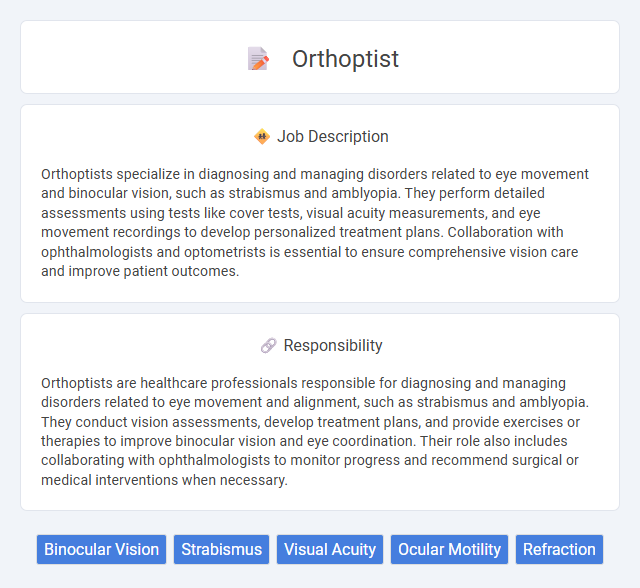
Orthoptists specialize in diagnosing and managing disorders related to eye movement and binocular vision, such as strabismus and amblyopia. They perform detailed assessments using tests like cover tests, visual acuity measurements, and eye movement recordings to develop personalized treatment plans. Collaboration with ophthalmologists and optometrists is essential to ensure comprehensive vision care and improve patient outcomes.
People with strong visual problem-solving skills and an interest in eye health are likely suitable for an orthoptist career, as the job involves diagnosing and treating eye movement disorders. Those who are patient, detail-oriented, and compassionate may find the role aligns well with their personal qualities, given the need for careful patient interaction and tailored treatment plans. Individuals who prefer hands-on clinical work and continuous learning about ocular conditions probably will find this profession rewarding and fitting.
Qualification
Orthoptists require a bachelor's degree in orthoptics or a related field, followed by specialized training and certification in eye movement disorders and binocular vision assessment. Clinical experience through internships or supervised practice is essential to develop skills in diagnosing and managing conditions like strabismus and amblyopia. Certification from recognized professional bodies, such as the American Orthoptic Council, validates proficiency and is often mandatory for employment in healthcare settings.
Responsibility
Orthoptists are healthcare professionals responsible for diagnosing and managing disorders related to eye movement and alignment, such as strabismus and amblyopia. They conduct vision assessments, develop treatment plans, and provide exercises or therapies to improve binocular vision and eye coordination. Their role also includes collaborating with ophthalmologists to monitor progress and recommend surgical or medical interventions when necessary.
Benefit
The role of an orthoptist likely offers significant benefits including specialized skills in diagnosing and managing eye movement disorders, which may provide a strong sense of professional fulfillment. Employment in this field probably offers opportunities for steady demand due to growing awareness and diagnosis of visual problems. Orthoptists might also experience a positive work-life balance given the typically structured hours in clinical settings.
Challenge
The role of an orthoptist likely presents challenges related to diagnosing and managing complex eye movement disorders, which may require precise clinical skills and detailed patient assessments. Working with diverse patient groups, including children and individuals with neurological conditions, could increase the difficulty level of treatment plans. The necessity for continuous learning and adapting to new technologies might also pose ongoing professional challenges.
Career Advancement
Orthoptists specializing in eye movement disorders can advance by obtaining certifications such as Certified Orthoptist or pursuing specialized training in pediatric vision therapy and neuro-ophthalmology. Gaining experience in multidisciplinary clinics enhances skills and opens opportunities for senior clinical positions or academic roles in teaching and research. Leadership roles in healthcare administration and involvement in clinical trials further contribute to career growth and professional development in the orthoptics field.
Key Terms
Binocular Vision
Orthoptists specialize in diagnosing and treating binocular vision disorders, which affect the coordinated use of both eyes for proper depth perception and eye alignment. They perform detailed assessments including cover tests, stereoacuity measurements, and eye movement evaluations to detect conditions such as strabismus, amblyopia, and convergence insufficiency. Through customized vision therapy and eye exercises, orthoptists help restore binocular function, improve visual comfort, and prevent long-term visual impairment.
Strabismus
Orthoptists specialize in diagnosing and treating strabismus, a condition characterized by the misalignment of the eyes. They perform detailed eye movement assessments and prescribe vision therapy to improve binocular coordination and reduce symptoms such as double vision or eye strain. Collaboration with ophthalmologists is essential for managing complex cases requiring surgical intervention or advanced medical treatment.
Visual Acuity
Orthoptists specialize in diagnosing and treating disorders related to visual acuity, such as amblyopia and strabismus. They perform detailed assessments using specialized equipment to measure the clarity and sharpness of a patient's vision. Their expertise is critical in developing personalized treatment plans that enhance visual performance and prevent long-term vision impairment.
Ocular Motility
Orthoptists specialize in diagnosing and treating disorders related to ocular motility, such as strabismus and amblyopia. They perform detailed assessments of eye movement and coordination, using tools like eye-tracking devices to evaluate binocular function and eye alignment. Expertise in ocular motility enables Orthoptists to develop personalized vision therapy plans to improve eye muscle control and prevent visual complications.
Refraction
Orthoptists specialize in diagnosing and managing binocular vision disorders, with a key focus on refractive assessment to determine the precise prescription for glasses or contact lenses. Their expertise in refraction tests allows for accurate identification of myopia, hyperopia, astigmatism, and presbyopia, ensuring optimal visual correction. Skilled use of tools like retinoscopes and autorefractors enhances their ability to provide tailored treatment plans that improve patient vision and eye health.
 kuljobs.com
kuljobs.com